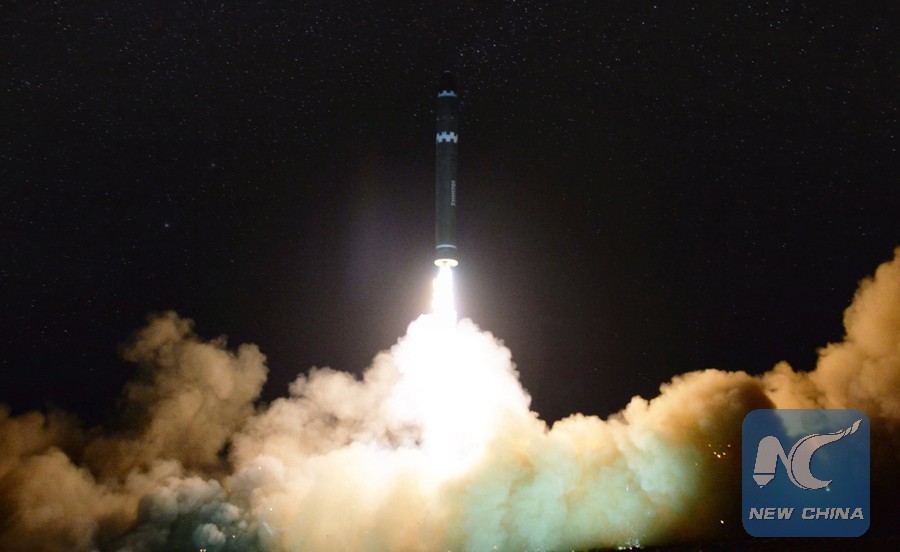
Cheerleaders of the Democratic People's Republic of Korea (DPRK) cheer during the pair skating short program of figure skating at the 2018 PyeongChang Winter Olympic Games, in Gangneung Ice Arena, South Korea, on Feb. 14, 2018. (Xinhua/Lan Hongguang)
WASHINGTON, Feb. 26 (Xinhua) -- The flame of PyeongChang Winter Olympics has finally kindled the prospect of direct engagement between Washington and Pyongyang before it flickered out on Sunday.
As the two countries expressed relatively positive attitude for direct talks on the same day, multiple challenges still lay ahead for the peaceful settlement of the Korean Peninsula issues.
POSITIVE SIGNALS IN ONE DAY
In a closed-door meeting with the Democratic People's Republic of Korea (DPRK)'s delegation, who came here to attend the closing ceremony of the Olympics earlier on Sunday, South Korean President Moon Jae-in said that dialogue between the DPRK and the United States should be rapidly held to fundamentally resolve the Korean Peninsula issues and improve ties between South Korea and the DPRK.
In response, the high-ranking DPRK delegation showed readiness to talk with the United States, saying that Pyongyang had enough willingness to hold talks with Washington, and agreed with Moon that inter-Korean relations and the DPRK-U.S. ties should progress.
Later, The White House issued a statement, saying that the United States, South Korea and the international community broadly agree that denuclearization must be the result of dialogue with the DPRK.
The White House said there is a brighter path available for Pyongyang if it chooses denuclearization. "We will see if Pyongyang's message today, that it is willing to hold talks, represents the first steps along the path to denuclearization."
However, it added that "the maximum pressure campaign must continue" until Pyongyang denuclearizes, and the administration of U.S. President Donald Trump will be "committed to achieving the complete, verifiable, and irreversible denuclearization of the Korean Peninsula."
U.S.-DPRK ENGAGEMENT
Analysts said that the positive attitudes of DPRK and the United States to solve the Peninsula issues via dialogue came from their eagerness to take the last chance of PyeongChang Olympics for bilateral engagement, after their meeting was canceled around the opening ceremony of the sports event.
Pyongyang has sent its olive branches by dispatching high-ranking delegations to attend the opening and closing ceremonies of the Winter Games. Its commitment for dialogues was also exemplified by the invitation for Moon to visit the DPRK and the offer to hold direct talks with the Seoul.

A cheerleader from the Democratic People's Republic of Korea (DPRK) leads the squad before the preliminary match of women's ice hockey between Switzerland and the unified team of DPRK and South Korea at the Pyeongchang 2018 Winter Olympic Games at the Kwandong Hockey Centre in Gangneung, South Korea, on Feb. 10, 2018. (Xinhua/Wang Song)
Moreover, the prospect of DPRK-U.S. engagement shall also be attributed to the China, South Korea, Russia and the international community as a whole, who have made unremitting efforts to mediate and lower the tensions and to create conditions and the proper atmosphere for possible dialogue, said experts.
With its own security concerns on top of the agenda, Washington also longs for direct communications with the DPRK to address strategic tensions and security worries. The sending of Trump's inner-circle officials was widely seen as a gesture to conduct direct engagement with the DPRK.
Analysts said the dialogue between Washington and Pyongyang could possibly begin through their existing channels of communication. When asked about these channels, Douglas Paal, vice president for studies at the Carnegie Endowment for International Peace, listed three channels of "the DPRK mission in New York, indirect (communication) through the Swedish embassy in Pyongyang, and...(talks) with various NGOs."
"We generally have better communication with North Korea (DPRK) than most people expect. There are a lot of these lower level contacts," said Troy Stangarone, senior director with the Washington-based Korea Economic Institute.
The U.S.-DPRK engagements are possible, but "more likely to be mid-level meetings rather than such a high-level meeting, any time in the near future," he added.
CHALLENGES AHEAD
Analysts said that with the huge differences of Washington and Pyongyang in such areas as the preconditions and goals of the dialogue, the prospect for their direct meeting faces multiple challenges.
The Trump administration has engaged in "maximum pressure" against the DPRK since assuming office in early 2017 to curb Pyongyang's nuclear and missile development program.

Photo provided by Korean Central News Agency (KCNA) on Nov. 30, 2017 shows the test-firing of an Intercontinental Ballistic Missile on Nov. 29, 2017. The Democratic People's Republic of Korea (DPRK) successfully test-fired a newly developed Intercontinental Ballistic Missile (ICBM), the country's Korean Central Television reported. (Xinhua/KCNA)
The new sanctions, the "largest-ever" package on the DPRK, will target 56 vessels, shipping companies, and trade businesses, said senior government officials last week.
While Pyongyang has responded by warning that if tension on the Korean Peninsula again escalates into a brink of war, "all the catastrophic consequences resulting therefrom will be borne by the United States."
The recent rhetoric of U.S. Vice President Mike Pence also raised international eyebrows. Pence reportedly said at a conservative group meeting in Maryland State on Feb. 23 that Kim Yo Jong, who is officially a first vice department director of the Central Committee of the Workers' Party of Korea, is "the center of a vicious regime" and "a central pillar of the most tyrannical and oppressive regime on the planet."

People watch news at train station in Seoul, South Korea, June 8, 2017. The Democratic People's Republic of Korea (DPRK) test-fired multiple projectiles believed to be ground-to-ship cruise missiles into its eastern waters, South Korea's Joint Chiefs of Staff (JCS) said. (Xinhua/Lee Sang-ho)
The DPRK furiously condemned Pence for his verbal attacks and ruled out any contact with the U.S. side at the closing ceremony of the Olympics by the DPRK delegation.
(Matthew Rusling from Washington also contributed to the story.)

